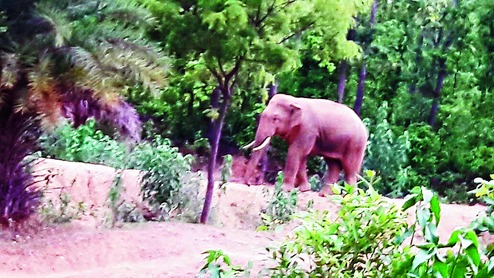
Keonjhar: Forest personnel have sought for de-tusking of a rogue jumbo that has unleashed acts of vandalism in the district.
A rogue male elephant has made its way to the Champua forests from its original habitat in Jharkhand. Since past seven months, the elephant has left its trail of destruction at the forest-side villages in damaging crops and houses. It has also trampled at least two persons to death, said Keonjhar divisional forest officer Rohit Kumar Lenka.
The ground-level forest employees have failed to drive the animal back to its original habitat. Earlier, it had been driven away to the Jharkhand forests. But soon, it reappeared to wreak havoc in the area.
Finding no other way, the department is thinking in terms of removing the animal's tusks after tranquillising it. "If the animal is de-tusked, there is every possibility that it will turn docile and give up its violent behaviour. We have written to the higher-ups in this regard for accordance of permission for the de-tusking operation," an official told The Telegraph.
De-tusking of a rogue elephant had been successfully carried out in Dhenkanal district in 2016, after an elephant killed as many as 40 people. The jumbo was no more violent after it was de-tusked, claimed a forest official.
Man-elephant confrontation has become a recurring phenomenon in most of the state's 44 forest divisions, identified as the elephants' habitation corridors.
In the Keonjhar forest division, such conflict has also become a major cause of worry. "The forest cover in the Champua range is often witnessing the straying of elephants, mostly from Jharkhand. The department has taken up a slew of measures to curb the conflict. An elephant-chaser squad, consisting of 209 contractual employees, has been formed to track the migratory path of the elephants. Round-the-clock vigil is being maintained to minimise the elephant-induced damage to life and property," said Lenka.
The service group of elephant-trackers, recruited from the forest-side villagers, are doing excellent jobs. Due to alertness on their part, rate of human casualty came down this year.
The jumbos wander, searching for food because of shrinking habitats. The protected parks and wildlife sanctuaries, conferred habitation corridors of the jumbos, face the onslaught of massive encroachment from people who live and forage, or graze cattle.











